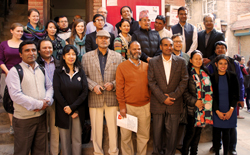Patan Academy of Health Sciences (Patan Hospital) and the Nepal Family Development Foundation are jointly conducting a typhoid Vaccine study (TyVac Nepal) in Lalitpur metropolitan city with the aim; to assess the impact of Vi-TCV in a field setting in order to inform and support the use of the vaccine as a control measure for enteric fever in endemic settings, to reduce global morbidity and mortality. We are enrolling 20 thousand children of age between 9month and below 16 years.
This Vi-TCV trial falls within a larger multi-institution collaboration, called The Typhoid Vaccine Acceleration Consortium (TyVAC). TyVAC is a Bill and Melinda Gates Foundation funded project to generate evidence for Vi-TCV vaccine impact, and accelerate use of Typhoid Conjugate Vaccines in countries with significant typhoid burden. Managed by University of Maryland, in collaboration with University of Oxford, and PATH international, the TyVAC programme includes vaccination trials, health economics studies, country preparedness support for routine vaccine introduction, and the collation and synthesis of typhoid research and evidence. Vi-TCV has shown promise from existing studies; it can produce seroconversion in infants; it potentially produces long lasting immunity; and it is efficacious in a controlled challenge setting. As such, it is an obvious candidate to test in a field impact study.
Three sites have been identified for parallel field impact studies; Kathmandu, Nepal; Dhaka, Bangladesh; and Blantyre, Malawi. Each represents a geographical setting where enteric fever is endemic and has a substantial local burden of disease. In each site, independent studies with differing study designs will be implemented to identify a range of impact scenarios. Between the sites, there is a range of demographic and geographic variation to give confidence in the generalisability of the study results. The trial presented here, is one of these three studies, which will be conducted in Kathmandu, Nepal.
Control of enteric fever, historically, has been established primarily through improved sanitation and infrastructure, leading to the elimination of disease as a public health problem from most developed countries. This remains the case, but there are substantial costs and difficulties implementing these measures in high typhoid incidence areas. As such, use of an effective vaccination programme targeting the highest risk populations will likely be a useful and cost-effective addition to control measures. Given the causative organisms are human-restricted, global eradication is possible and an effective vaccine will contribute to this.
Group Photo after inauguration of first vaccination
